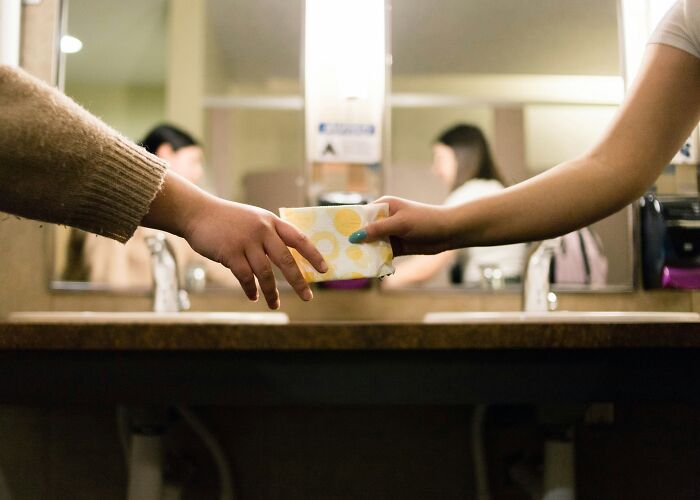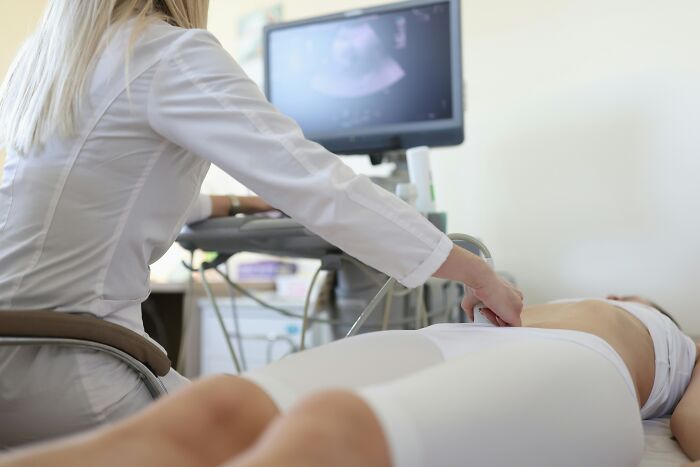Saffron Devereux McCarthy sought a consultation with a doctor when she grew concerned that she still hadn’t started her period by the age of 17.
The teen suspected that the issue might be linked to the fact that she was born with a single kidney, positioned unusually in her pelvic region, and that it was “messing with my hormones or organs,” she told Newsweek.
In early 2024, she was referred to a kidney specialist who, to her surprise, offered no explanation for why she hadn’t started her period while all of her friends already had.
Between the ages of 17 and 19, she consulted various specialists to get answers about why she hadn’t menstruated.
At 17, Saffron Devereux McCarthy sought medical advice after growing worried that she had not yet started her period

Image credits: saffronmcc
These consultations were spaced out over months due to the difficulty of securing an appointment in Ireland, Saffron said.
One of her medical appointments was with an endocrinologist, who ordered blood tests and an ultrasound.
Saffron finally learned the correct diagnosis during an ultrasound in June 2025, when doctors said they couldn’t find her uterus.
Feeling confused and anxious about the results, the 19-year-old returned four months later for a follow-up appointment at St. James’s Hospital in Dublin, where doctors confirmed she had been born without a uterus.

“I broke down in tears and so did my mom,” Saffron told Newsweek.
The condition, known as Mayer-Rokitansky-Küster-Hauser (MRKH) syndrome, is a congenital condition resulting from incomplete development of the upper vagina, cervix and uterus/womb during early fetal development.
MRKH is rather rare, affecting approximately 1 in 4,500 female infants.
She suspected her kidney anomaly might be linked to the issue, but initial consultations with specialists offered no answers


“The exact cause is not fully understood, though both genetic and environmental factors are thought to play a role,” Dr. Sotirios Saravelos, a gynaecologist and subspecialist in reproductive medicine and surgery at Imperial College Healthcare NHS Trust told Bored Panda in an email.
“A frequent misconception is that women with MRKH do not have ovaries and cannot have their own biological babies.
“However, with appropriate medical support and with advances in fertility treatment they can now have their own biological children.”
After two years of seeking medical explanations, she finally learned during a June 2025 ultrasound that she had no uterus

Though individuals with MRKH do not have a functional uterus, their ovaries are usually “entirely normal,” the gynaecologist explained.
“This means they can have their own biological/genetic children through IVF and gestational surrogacy.
“The way we do this is by performing IVF treatment where we collect eggs from a woman with MRKH, fertilise (i.e join) them with sperm to form embryos and then transfer these embryos into another woman with a uterus (called the surrogate).
“A surrogate can be a relative such as a sister or cousin, a friend or any other woman who wishes to altruistically help these women with MRKH have a baby.”

An alternative option for those with MRKH who want to become parents is to undergo a uterine transplant.
Dr. Saravelos said the procedure “is an emerging option that has enabled some women with MRKH carry a pregnancy, though it remains highly specialised and limited to a few centres worldwide.”
The first baby born after a uterine transplant in the UK was at the Imperial College NHS hospital, the expert said.
Saffron was born with Mayer-Rokitansky-Küster-Hauser (MRKH) syndrome, a rare congenital disorder affecting 1 in 4,500 females
@saffronmcc trying not to crash out. why are women’s health so disregarded #ireland #mrkh ♬ original sound – ssversion
People with MRKH syndrome may have issues with their kidneys or spine, as Saffron does.
“The kidneys develop nearby during the same time as the reproductive organs which helps explain why some individuals with MRKH also present with kidney anomalies,” Dr. Saravelos explained.
However, MRKH does not affect puberty, since puberty in females is driven primarily by the ovaries, which produce estrogen and other hormones that trigger breast growth and pubic hair, not the uterus.


The doctor who delivered the news wasn’t very empathetic, the teen shared on her TikTok account.
“She just said things like, ‘It’s not the end of the world’ and ‘other women experience this too,’ which didn’t reassure me at all,” she said.
“I walked out of that appointment feeling frustrated and hopeless.”
Saffron said she’s still in “utter disbelief” that experts didn’t order an ultrasound immediately, given the anomalies with her kidney, and concluded, “I just need to process it now, but I know I’ll get through it!!”
People were surprised that doctors did not diagnose her with MRKH earlier





















